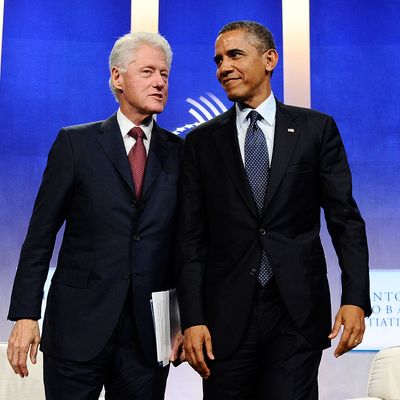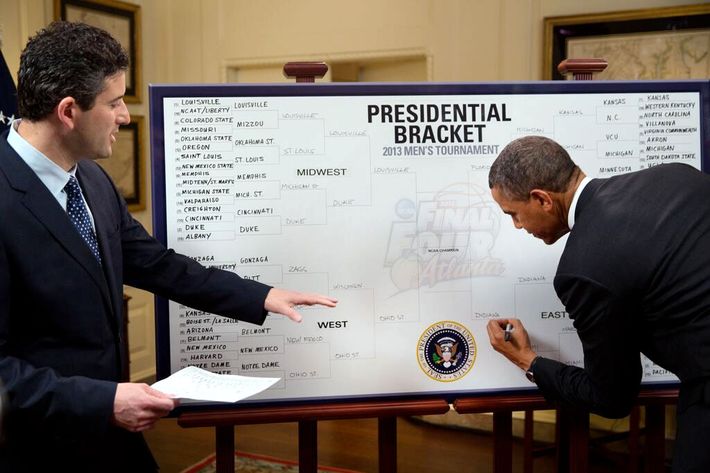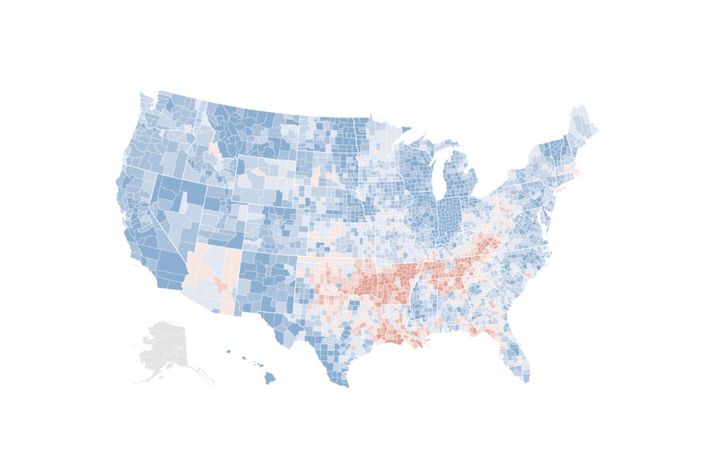
In Kentucky, Republican Senate Minority Leader Mitch McConnell is running even or slightly behind in polls for reelection, despite the state’s heavily Republican lean. The central dynamic of the race concerns whether the Democratic challenger, Alison Lundergan Grimes, can distance herself from President Obama. McConnell is painting Grimes as Obama’s puppet, while Grimes is instead attaching herself to Bill and Hillary Clinton, who are far more popular in the state. Why is that? Here, in today’s Washington Post, is an odd passage explaining Clinton’s popularity vis-à-vis Obama:
While President Obama’s approval rating in Kentucky is in the mid-30s, Bill Clinton — with his southern roots and love of college basketball and horse racing — is popular in the Bluegrass State, which he carried in both of his presidential elections.
That’s why Clinton runs so far ahead of Obama? Horse racing and college basketball? Obama loves college basketball. He makes a huge public show of it, filling out his bracket every year on national television and granting interviews during the NCAA tournament.

One reason for Clinton’s popularity is that all ex-presidents tend to gain favor as they recede from the partisan infighting of day-to-day politics and position themselves as revered elder statesmen. But the other reason Clinton could always compete in Kentucky while Obama never could is one that does not appear anywhere in the Post story: race.
Six years ago, in the midst of a still-heated contest for the Democratic presidential nomination, George Packer traveled to Kentucky, where voters there registered surprisingly candid reasons for their support for Hillary Clinton over Barack Obama. The mere fact that Kentuckians would endorse Clinton (whose base within the Party leaned heavily on the white working class) was the opposite of surprising. What shocked about Packer’s report was, first, the explicitly racial tone of the opposition. Voters were not bothering to couch their disdain for Obama in euphemisms about affirmative action or crime or even Jeremiah Wright. They were saying things like, “I think [Obama] would put too many minorities in positions over the white race.” Nearly as surprising was the fact that, despite such beliefs, they were willing to vote for Democrats anyway.
In his decisive 2008 win, Obama obviously improved on John Kerry’s losing 2004 performance overall. But across a small band of counties concentrated in the Deep South and Appalachia, he actually performed worse than Kerry, despite running a good five points better nationwide:

I suppose you could attribute the difference to “culture,” with Obama representing elite academic urban America, but it’s not as if Kerry cut the figure of a prototypical Regular Joe. The difference is also hard to explain via other easy regional touchstones, like guns or coal, given that Obama was no more pro-environment or anti-gun than Kerry, and his opponent, John McCain, was hostile to the NRA and favorable to cap and trade. It’s hard to come up with any explanation to rival what Packer found — race.
Reporters approach this reality with varying levels of delicacy. The accusation of East Coast elitism always hangs unspoken, so it can be easier to attribute the unusually intense hostility to Obama in the region to his implied lack of enthusiasm for college basketball than to his skin color. But Jason Zengerle’s great profile of McConnell laid the dynamic perfectly bare:
“We are still a racist state, I hate to admit it,” says the Kentucky GOP strategist. “Anything you can connect to Barack Obama is a winning thing for us.” Or, as a prominent Kentucky Democrat puts it: “The only way they can beat [Grimes] is to paint her skin a different color than it is and make her gender a different gender than it is. They’re going to have to make her Barack Obama.
Sam Youngman – the journalist who briefly commanded attention with a putatively confessional essay explaining his move from Washington to Lexington – actually assailed Zengerle’s source for admitting this in public:
And to be sure, Kentucky is not a “racist state” in the sense that everybody in it is racist. But race is a central dynamic, and the outcome of the election will turn in large part on whether Grimes can appeal to white Democrats who don’t want to support an African-American. (Probably many of these voters are the same ones who love the state’s new health-care law but hate Obamacare.) It’s also a reality that is too uncomfortable for many observers to actually state.






























